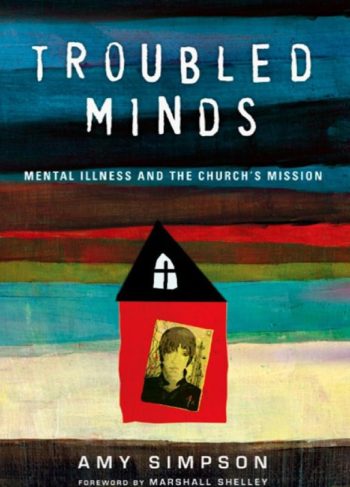Author Amy Simpson, who wrote the award-winning book, Troubled Minds, with a very good reminder for Christians who are leery of antidepressants.
Simpson writes (emphasis added).
*****************************************************************************************************************************
“I recently read an article by a Christian writer questioning whether Christians should take antidepressants, because emotional pain can cause us to lean more heavily on Christ.
Physical pain can have the same effect, but when I had back surgery, no one questioned whether I should all ow the surgeon to use general anesthesia.
…..Yes, severe emotional pain and other symptoms of mental illness can drive us closer to our savior.
They can also drive us to cause serious harm to the people around us, reject our faith, believe lies and commit suicide.”
*****************************************************************************************************************************
End quote (You can read my interview with Amy here).
That last part is so good.
If you feel that clinical depression and anxiety are drawing you closer to Christ, okay, but if you have the symptoms, then by definition, they’re probably pushing you farther away from those around you.
When I’m depressed or anxious, it’s much harder to be a loving, engaged dad and husband. That’s not just me. It’s a symptom of the disease.
Will I pray more? Perhaps. Sometimes.
But will I be kinder, more involved as a parent, husband, and overall person? Probably not.
And that’s what God wants from me. How I treat others, not how much I pray.
Depression isolates us (there goes the engaging part), anxiety makes us irritable (there goes the loving part) and depression and anxiety immobilize us (there goes our life).
So if there’s treatment (talk to a doctor first), getting it seems the most loving, Christian thing to do.
I’ve known so many who began flourishing again after total immobilization.
Pastor Kirby Smith is a particularly good example of this.
In our interview last year, he talks candidly, in gripping detail, about being utterly paralyzed in his church office, praying for death, waking up with panic attacks so severe he didn’t know he could survive them. Losing his church, nearly his mind. All that.
And then he got treatment (ECT and medicine), and now he’s pastoring again, doing great things, and not living in misery.
Treatment doesn’t just save the victim. It helps everyone around the victim.
It’s also important to note that there’s a difference between grief and depression. Every human grieves. And in that, we often do see the Father closer.
But depression is another devil entirely because it lies to you about everything. Your brain works against you.
It’s nearly impossible to see anything good about The Good News, because it’s impossible to see good in anything, and even if there is something good, it’s not for you.
In her book Companions in the Darkness, author Diana Gruver notes that the deeply depressed, Christian poet William Cowper told others the Good News of Christ was for everyone but himself.
That was his depression preaching a lie.
It certainly wasn’t Christ, who told all to come.
The only good I’ve seen from my own depression, anxiety, and OCD isn’t a closer walk with God, it’s the fact that I can now say “I know” and really know when I talk with people who have those conditions.
And if you have it, that’s probably the same for you.
When you talk with others, there’s an instant connection, a shared misery that can actually promote a smile — like two soldiers who talk lovingly of home and how they’ll get there, while they’re at battle, freezing and a second from death.
Pastor Scott Sauls says that sharing his battle with depression/anxiety brought him closer to his congregation. They now recognized him as someone who truly understood, and that’s one of the beautiful things about Christ. His time in the Garden is far more compelling to humans than his Transfiguration. We understand the first, the second feels almost fantastical because we’ve never seen or known it.
So I’m not saying that good can’t come from depression or anxiety in a weird, roundabout way. Hopefully, something good — at some point — will come from it.
But as Simpson noted, it’s also quite possible it will lead to suicide, the dissolution of marriage, the complete withering of spiritual growth, and total heartbreak for everyone involved in the situation.
If taking a pill makes that less likely, well, I’m going to.
And here are two things that can be true at the same time: Medicine can save your life, but only Christ can save your soul.
We wouldn’t bat an eyelash if someone said that about heart surgery, but for some reason, Christian resistance to the medical component of mental health remains astonishingly strong and truly damaging to both the victim and those around them.
If you’re currently struggling, and want to know more…..
Here’s a psychiatrist near you.
And a therapist.

